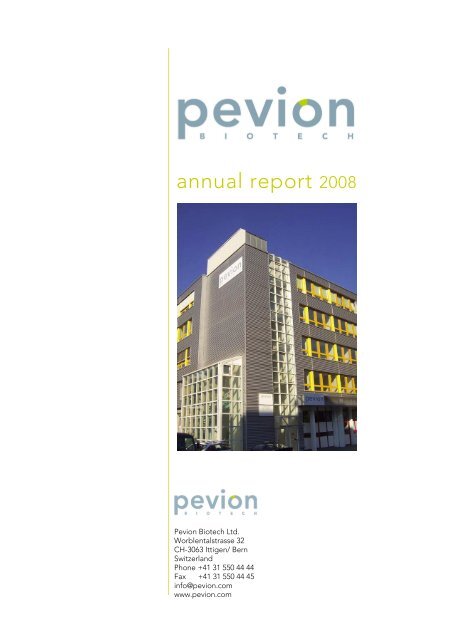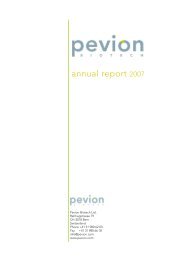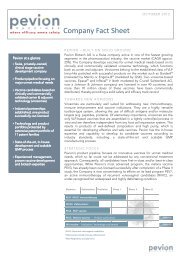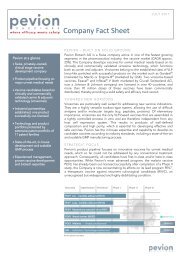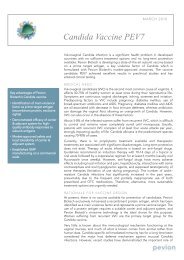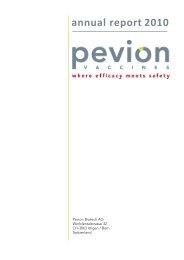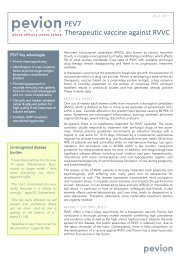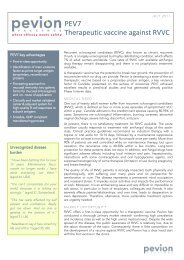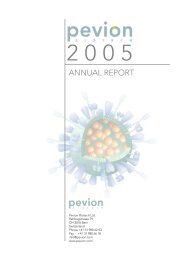Create successful ePaper yourself
Turn your PDF publications into a flip-book with our unique Google optimized e-Paper software.
<strong>annual</strong> <strong>report</strong> <strong>2008</strong><br />
<strong>Pevion</strong> <strong>Biotech</strong> Ltd.<br />
Worblentalstrasse 32<br />
CH-3063 Ittigen/ Bern<br />
Switzerland<br />
Phone +41 31 550 44 44<br />
Fax +41 31 550 44 45<br />
info@pevion.com<br />
www.pevion.com
<strong>2008</strong> ANNUAL REPORT 2<br />
C O N T E N T S<br />
LETTER FROM THE CEO .................................................................................... 3<br />
HIGHLIGHTS <strong>2008</strong> ............................................................................................... 4<br />
COMPANY PROFILE ........................................................................................... 5<br />
MAN<strong>AG</strong>EMENT................................................................................................... 5<br />
BOARD OF DIRECTORS ..................................................................................... 6<br />
SCIENTIFIC ADVISORY BOARD ......................................................................... 7<br />
VIROSOME-BASED TECHNOLOGY .................................................................. 8<br />
LEAD PROJECTS <strong>2008</strong> ........................................................................................ 9<br />
INTELLECTUAL PROPERTY .............................................................................. 13<br />
<strong>Pevion</strong>_<strong>Biotech</strong>_<strong>annual</strong>_<strong>report</strong>_<strong>2008</strong>_final.docx
<strong>2008</strong> ANNUAL REPORT 3<br />
L E T T E R F R O M T H E C E O<br />
D E A R S H A R E H O L D E R ,<br />
<strong>Pevion</strong>_<strong>Biotech</strong>_<strong>annual</strong>_<strong>report</strong>_<strong>2008</strong>_final.docx<br />
<strong>2008</strong> A N N U A L R E P O R T<br />
I am delighted to present our <strong>2008</strong> <strong>annual</strong> <strong>report</strong>. <strong>2008</strong> was a milestone year<br />
in the history of <strong>Pevion</strong> <strong>Biotech</strong>. In July the company moved into its new<br />
premises in Ittigen near Bern/Switzerland. The new premises have a total of<br />
1600 m 2 , including 800 m 2 of laboratory space equipped with state-of-the-art<br />
laboratories. The new laboratories have been designed to meet <strong>Pevion</strong><br />
<strong>Biotech</strong>'s requirements. They provide a basis on which the company can<br />
develop its products at highest standards also in the future. <strong>Pevion</strong> <strong>Biotech</strong><br />
now has enough laboratory and office space to allow the company to grow<br />
and hire employees required for the later stage development of the<br />
products. The smooth relocation was only possible because of the<br />
tremendous motivation and enthusiasm of all <strong>Pevion</strong> employees and<br />
specifically the ones who managed the whole reconstruction of the new<br />
premises. The professionalism of this relocation is also observable by the fact<br />
that the whole team was completely operational within one week after<br />
moving to the new premises. To a considerable extent, the relocation of the<br />
company has also been supported by the Bern Economic Development<br />
Agency. I am convinced that the relocation represents a cornerstone for<br />
<strong>Pevion</strong> <strong>Biotech</strong> to continue its sustained growth.<br />
As an effect of the relocation, the company had to renew its license for<br />
manufacturing of investigational medicinal products. The Swiss Agency for<br />
Therapeutic Products (Swissmedic) inspected the company in early October<br />
<strong>2008</strong>. The company passed the inspection without any major issues and even<br />
received an extended license which additionally includes the market release<br />
of the investigational medicinal products.<br />
Regarding <strong>Pevion</strong> <strong>Biotech</strong>'s vaccine candidates, in <strong>2008</strong> the company<br />
finalized the acquisition and licensing of its most advanced product, the<br />
vaccine against malaria infections. <strong>Pevion</strong> <strong>Biotech</strong> has already earned<br />
substantial milestone payments based on this license. This puts <strong>Pevion</strong><br />
<strong>Biotech</strong> in a very good financial position and offers a promising outlook for<br />
2009.<br />
<strong>Pevion</strong> <strong>Biotech</strong> has now grown to 22 employees, whereas 17 of them work in<br />
R&D. In 2009, the company will further extend its expertise, especially in the<br />
area of clinical development and regulatory affairs. This will allow us a<br />
thorough development of the vaccine candidates until clinical Phase II.<br />
I want to thank our employees for their dedication and hard work, and I am<br />
convinced that with the support of this enthusiastic and experienced team,<br />
<strong>Pevion</strong> <strong>Biotech</strong> will advance its vaccine candidates to the point where they<br />
can be partnered.<br />
I am looking forward to all new challenges, to increasing the value of the<br />
company significantly and to promoting the promising virosome technology.<br />
Sincerely,<br />
Dr. Thomas Stauffer<br />
CEO <strong>Pevion</strong> <strong>Biotech</strong> <strong>AG</strong>
<strong>2008</strong> ANNUAL REPORT 4<br />
H I G H L I G H T S 2 0 0 8<br />
<strong>Pevion</strong> <strong>Biotech</strong> moved to Ittigen<br />
<strong>Pevion</strong>_<strong>Biotech</strong>_<strong>annual</strong>_<strong>report</strong>_<strong>2008</strong>_final.docx<br />
<strong>2008</strong> A N N U A L R E P O R T<br />
In July <strong>2008</strong> <strong>Pevion</strong> <strong>Biotech</strong> moved to new premises in Ittigen/Bern which<br />
were rebuilt for <strong>Pevion</strong> <strong>Biotech</strong>'s purposes. <strong>Pevion</strong> <strong>Biotech</strong> was fully<br />
operational after one week.<br />
Mymetics Corporation Acquires Preventive Malaria Vaccine from<br />
<strong>Pevion</strong> <strong>Biotech</strong> <strong>AG</strong> (Switzerland)<br />
Mymetics Corporation, a vaccine development company, made the<br />
acquisition of a preventive malaria vaccine from <strong>Pevion</strong> <strong>Biotech</strong>. The <strong>Pevion</strong><br />
<strong>Biotech</strong> vaccine has successfully completed human clinical trial phases I and<br />
IIa in Switzerland and in the UK.<br />
Successful Swissmedic Inspection<br />
The Swiss Agency for Therapeutic Products, Swissmedic, conducted its third<br />
regulatory inspection at <strong>Pevion</strong> <strong>Biotech</strong>. The company passed it successfully<br />
and was awarded an extension of the manufacturing license for<br />
investigational medicinal products. The Certificate of GMP Compliance<br />
states that the required level for good practices in the manufacture of<br />
pharmaceutical products and active pharmaceutical ingredients according to<br />
valid Swiss regulations has been met. These regulations are in accordance<br />
with the requirements for good practices in the manufacture and quality<br />
control of the Pharmaceutical Inspection Convention/Co-operation Scheme<br />
(PIC/S) and the directives of the European Commission.<br />
Breast Cancer Clinical Phase I – Interim results<br />
The Phase I study was started in November 2006 to give information about<br />
the safety and immunogenicity of the virosome-based breast cancer vaccine<br />
candidate. Preliminary data from the first group of patients receiving the low<br />
dose of the vaccine show that the vaccine is safe and well-tolerated.<br />
Furthermore, from the immunological data gained it can be concluded that<br />
the formulation is immunogenic and has led to a seroconversion in eight out<br />
of nine patients.<br />
<strong>Pevion</strong> <strong>Biotech</strong> Signs Cooperation Agreement with ISS<br />
<strong>Pevion</strong> licensed an antigen (SAP2) for its vaccine against candidiasis from the<br />
Istituto Superiore di Sanità (ISS). The vaccine candidate is being developed<br />
to treat and prevent Candida infections and even chronic vulvovaginitis.
<strong>2008</strong> ANNUAL REPORT 5<br />
C O M P A N Y P R O F I L E<br />
<strong>Pevion</strong>_<strong>Biotech</strong>_<strong>annual</strong>_<strong>report</strong>_<strong>2008</strong>_final.docx<br />
<strong>2008</strong> A N N U A L R E P O R T<br />
<strong>Pevion</strong> <strong>Biotech</strong> is a privately owned vaccine developing company focusing<br />
on the preclinical and clinical development of vaccines to prevent mucosal<br />
infections and cancer. The company has a risk-balanced portfolio targeting<br />
diseases with high medical need. For its vaccine development, the company<br />
uses its proprietary virosome technology which is already validated by two<br />
registered and marketed vaccines. The combination of this virosome<br />
technology with novel innovative antigens substantially reduces the known<br />
risk in biotechnological development.<br />
<strong>Pevion</strong> has brought forth a well-focused product pipeline filled with vaccine<br />
candidates that have the potential to go far beyond current achievements in<br />
vaccinology. Not only do they efficiently meet so far unmet major medical<br />
needs, <strong>Pevion</strong> <strong>Biotech</strong>'s products also address one issue that has become<br />
the bottleneck of modern vaccine development: safety.<br />
<strong>Pevion</strong> <strong>Biotech</strong>'s target indications include breast cancer, candidiasis, RSV,<br />
influenza and malaria. <strong>Pevion</strong> <strong>Biotech</strong> has an extensive patent portfolio<br />
covering license rights as well as patents and patent applications filed<br />
directly by the company. The company's intellectual property rights cover<br />
various aspects and applications of the technology. The company also owns<br />
various registered trademarks.<br />
<strong>Pevion</strong> <strong>Biotech</strong>'s product pipeline as of December 31, <strong>2008</strong><br />
M A N A G E M E N T<br />
Peter Klein, Chief Executive Officer (CEO)<br />
Peter Klein was head of regulatory affairs at Berna <strong>Biotech</strong> prior to joining<br />
<strong>Pevion</strong> <strong>Biotech</strong>. His previous professional activities include 8 years of<br />
experience as head of the registration department at the Swiss Drug<br />
Regulatory Authority SWISSMEDIC, 10 years in private consulting to the<br />
pharmaceutical industry (Europe, USA and Japan) and 4 years of<br />
employment in medium-sized pharmaceutical companies in clinical<br />
development and registration of pharmaceutical products. Peter Klein<br />
studied biology at the University of Basel, Switzerland.
<strong>2008</strong> ANNUAL REPORT 6<br />
Dr. Thomas Stauffer, Chief Operating Officer (COO)<br />
Thomas Stauffer joined <strong>Pevion</strong> <strong>Biotech</strong> in 2002. Prior to his position at <strong>Pevion</strong><br />
<strong>Biotech</strong>, he served as an IP consultant for small and midsize biotechnology<br />
companies and built and managed a department for IP services at the Swiss<br />
Federal Institute of Intellectual Property. Prior to that, Thomas Stauffer<br />
worked for 3 years at Duke University Medical Center (Durham, NC). Thomas<br />
Stauffer received his degree from the Swiss Federal Institute of Technology<br />
in Zurich, Switzerland.<br />
Dr. Rinaldo Zurbriggen, Chief Scientific Officer (CSO)<br />
Rinaldo Zurbriggen is co-founder of <strong>Pevion</strong> <strong>Biotech</strong>. Prior to joining <strong>Pevion</strong><br />
<strong>Biotech</strong>, Rinaldo Zurbriggen was head of the virus research department at<br />
Berna <strong>Biotech</strong>, where he was responsible for the development of virosomebased<br />
vaccines from 1996 on. During this period his department enabled<br />
Berna <strong>Biotech</strong> to register the first virosome-based vaccine (Epaxal) in Europe.<br />
Rinaldo Zurbriggen is a leading expert for virosomes and has published more<br />
than 30 papers in peer-reviewed scientific journals in this field. Rinaldo<br />
Zurbriggen earned his degree at the University of Fribourg, Switzerland.<br />
B O A R D O F D I R E C T O R S<br />
Peter Grogg, PhD, Chairman of the Board, President, Bachem Holding<br />
<strong>AG</strong><br />
Peter Grogg founded Bachem in 1971 and is chairman of the Board of<br />
Directors of the Bachem Group. He holds main seats on other boards, e.g.<br />
Dottikon ES Holding <strong>AG</strong>, and is management board member of the Swiss<br />
Association for the Chemical Industry and of the Basel Chamber of<br />
Commerce. He was awarded the academic degree of Doctor of Philosophy<br />
honoris causa by the University of Basel, Switzerland.<br />
Kuno Sommer, PhD, Vice-Chair of the Board, CEO RCC<br />
Kuno Sommer studied business administration at the University of Basel.<br />
Before 1990 he held various positions with Roche <strong>AG</strong> Vitamin Marketing.<br />
From 1990 to 1994 he was head of the North American branch of the Roche<br />
Animal Feed and Health Division; from 1995 he was manager of global<br />
marketing for the Vitamin and Speciality Chemicals Division in Basel, CEO of<br />
Givaudan-Roure in Geneva and member of the Executive Committee of<br />
Roche <strong>AG</strong> in 1998/99.<br />
Klaus Breiner, PhD, Member of the Board, BB <strong>Biotech</strong> Ventures II<br />
Dr. Klaus Breiner is a venture capital investor with BB <strong>Biotech</strong> Ventures at<br />
Bellevue Group. The Bellevue Group is one of the largest financial investors<br />
in the health care segment. Dr. Breiner has invested in numerous emerging<br />
biotech and pharma companies in the U.S. and Europe. His current and past<br />
board assignments include Agendia BV, Alpex Pharma SA, Cadence<br />
Pharmaceuticals Inc., Glycart <strong>Biotech</strong>nology <strong>AG</strong>, and Orthocon Inc. Dr.<br />
Breiner holds a PhD in molecular biology and has spent most of his research<br />
career in virology.<br />
Daniel Erne, PhD, Member of the Board, CTO Bachem Holding <strong>AG</strong><br />
Daniel Erne joined Bachem <strong>AG</strong> in 1987 as head of quality control. Since 1997<br />
he has been a member of the corporate executive committee of the Bachem<br />
Group and responsible for quality assurance and regulatory affairs. He<br />
studied chemistry at the Swiss Federal Institute of Technology in Zurich<br />
(ETHZ) and then became a research fellow at the University of Utah, Salt Lake<br />
City and at ETHZ before joining Bachem <strong>AG</strong>.<br />
<strong>Pevion</strong>_<strong>Biotech</strong>_<strong>annual</strong>_<strong>report</strong>_<strong>2008</strong>_final.docx
<strong>2008</strong> ANNUAL REPORT 7<br />
S C I E N T I F I C A D V I S O R Y B O A R D<br />
Besides its internal scientists, <strong>Pevion</strong> <strong>Biotech</strong> has established a scientific<br />
advisory board comprised of highly skilled experts, including academic<br />
researchers in immunology, biochemistry as well as clinical oncology.<br />
Professor Albert Osterhaus, PhD<br />
Professor Osterhaus is a world-renowned specialist for infectious diseases<br />
and vaccines. He studied and completed his doctorate at the University of<br />
Utrecht and held various positions at the National Institute of Public Health<br />
and Environment (RIVM) in Bilthoven, the Netherlands. He was directly<br />
involved in the establishment of three companies. Among other positions,<br />
Professor Osterhaus currently holds the position of Professor of Virology,<br />
Erasmus University Hospital, Rotterdam and is member of a number of WHO<br />
committees.<br />
Professor Antonio Lanzavecchia, MD, PhD<br />
Professor Antonio Lanzavecchia is a world-renowned immunologist with a<br />
research focus on different aspects of cellular immunology: antigen<br />
processing and presentation, dendritic cell biology, lymphocyte activation<br />
and lymphocyte traffic. He studied at the University of Pavia and then<br />
specialized in pediatrics and infectious diseases. He was a member of the<br />
staff at the Basel Institute for Immunology and became director of the<br />
Institute for Research in Biomedicine in Bellinzona and professor at the<br />
University of Siena. He was awarded the EMBO Medal in 1988 and the<br />
Cloëtta Prize in 1999.<br />
Professor Alan Gewirtz, MD, PhD<br />
The laboratory of Professor Alan Gewirtz focuses on the cell biology of<br />
normal and malignant human hematopoiesis. He began his studies at<br />
Colgate University and became assistant professor at Temple University<br />
School of Medicine. He then was appointed director of the Clinical<br />
Hematology Laboratory at Temple University Hospital as well as associate<br />
professor at the University of Pennsylvania, where he currently heads the<br />
Hematologic Malignancies Program.<br />
Professor Josef Brunner, PhD<br />
Professor Josef Brunner’s most important research topics are the<br />
development of new photochemical marking methods to examine complex<br />
systems, the fusion of biological membranes as well as the role of lipids and<br />
lipid metabolites in signal transduction. He studied at Technical College<br />
(HTL) in Burgdorf, Switzerland and ETH Zurich, where he was awarded the<br />
ETH Silver Medal. After a postdoctorate at the Department of Molecular<br />
Biophysics and Biochemistry, Yale University, he headed his own research<br />
group at ETH Zurich.<br />
<strong>Pevion</strong>_<strong>Biotech</strong>_<strong>annual</strong>_<strong>report</strong>_<strong>2008</strong>_final.docx
<strong>2008</strong> ANNUAL REPORT 8<br />
V I R O S O M E - B A S E D T E C H N O L O G Y<br />
<strong>Pevion</strong>_<strong>Biotech</strong>_<strong>annual</strong>_<strong>report</strong>_<strong>2008</strong>_final.docx<br />
<strong>2008</strong> A N N U A L R E P O R T<br />
Virosomes are a market-approved carrier system for the delivery of<br />
immunologically active substances, allowing the correct spatial presentation<br />
of peptides and proteins and facilitating delivery of antigens. Therefore<br />
virosomes act as carrier and adjuvant.<br />
Virosomes consist of<br />
reconstituted empty influenza<br />
virus envelopes devoid of the<br />
nucleocapside, including the<br />
genetic material of the source<br />
virus. They are not able to<br />
replicate, but rather are pure<br />
fusion-active vesicles. In<br />
Influenza virus Virosome<br />
contrast to liposomes,<br />
virosomes contain functional<br />
viral envelope glycoproteins:<br />
influenza virus hemagglutinin and neuraminidase intercalated in the<br />
phospholipid bilayer membrane.<br />
The unique properties of virosomes partially relate to the presence of these<br />
glycoproteins. Not only do they confer structural stability and homogeneity<br />
to virosome formulations, but they significantly contribute to the<br />
immunological properties of virosomes, which are clearly distinct from other<br />
liposomal and proteoliposomal carrier systems. These proteins enable the<br />
virosome membranes to fuse with cells of the immune system and thus<br />
deliver their contents – the specific antigens – directly to their target cells,<br />
eliciting a specific first-class immune response even with weak-immunogenic<br />
antigens. Once they have delivered the antigens, the virosomes are<br />
completely metabolized. Conventional adjuvants like aluminum cannot be<br />
degraded by the body.<br />
M A N U F A C T U R I N G O F V I R O S O M E S<br />
In <strong>2008</strong> <strong>Pevion</strong> <strong>Biotech</strong> developed techniques to optimize synthetic multiepitope<br />
antigens and to attach antigens to virosomes after the formulation.<br />
Both techniques will reduce the manufacturing effort while keeping the<br />
optimal immune responses.<br />
Furthermore, fee-for-service activities were supplied by the technology<br />
group. In <strong>2008</strong> <strong>Pevion</strong> <strong>Biotech</strong> delivered customized formulations to several<br />
companies.<br />
Principle of lyophilization<br />
Working with synthetic peptides or recombinant proteins often has the<br />
disadvantage of limited stability. In addition, vaccines are temporarily<br />
exposed to elevated temperatures that cause losses in vaccine efficacy.<br />
Lyophilization (freeze-drying) is a process that is especially useful for<br />
enhancing stability for long-term storage of biological materials such as<br />
proteins and vaccines, and it can make refrigerated storage obsolete for<br />
normally temperature-sensitive materials. However, conventional "first<br />
generation" virosomes cannot be lyophilized without loss of<br />
immunogenicity, particle size homogeneity and the functional activity of the<br />
influenza HA. Therefore, <strong>Pevion</strong> <strong>Biotech</strong> has developed a new generation of<br />
virosomes which are able to induce strong immune responses and which<br />
feature improved storage and stability properties. This is combined with a<br />
simple and fast preparation method that offers a great flexibility in<br />
combining several specific antigens of choice while retaining the adjuvant<br />
properties and the excellent safety profile.
<strong>2008</strong> ANNUAL REPORT 9<br />
L E A D P R O J E C T S 2 0 0 8<br />
Development pipeline of <strong>Pevion</strong> <strong>Biotech</strong><br />
<strong>Pevion</strong>_<strong>Biotech</strong>_<strong>annual</strong>_<strong>report</strong>_<strong>2008</strong>_final.docx<br />
<strong>2008</strong> A N N U A L R E P O R T<br />
<strong>Pevion</strong> <strong>Biotech</strong>’s product pipeline consists of vaccines to treat or prevent<br />
infectious diseases and cancer, representing high unmet medical needs:<br />
Breast cancer<br />
Malaria (partnered)<br />
Candidiasis<br />
Respiratory Syncytial Virus (RSV)<br />
Influenza<br />
Additional products are in preclinical development.<br />
B R E A S T C A N C E R V A C C I N E<br />
<strong>Pevion</strong> <strong>Biotech</strong>’s approach<br />
<strong>Pevion</strong> <strong>Biotech</strong> and its Austrian partner Bio Life Sciences have jointly<br />
developed a vaccine against breast cancer which is based on a novel<br />
approach to cancer therapy. The approach is based on the Her-2/neu tumor<br />
antigen. A humoral immune response is induced through an active<br />
immunization with the virosome based vaccine. Two clinical validated and<br />
market approved elements – the well-established virosome technology and<br />
the Her-2/neu-antigen – are recombined to bring forth an innovative product<br />
candidate, while minimizing developmental risks. The vaccine candidate,<br />
which is currently in clinical testing, is designed to increase the time to<br />
disease progression and reduce the recurrence of disease and the<br />
development of metastases in particular. It is intended to be applied after<br />
standard treatment as well as in combination with chemotherapy.<br />
New in <strong>2008</strong>: Clinical Phase I trial<br />
A Phase I clinical trial is currently ongoing in Vienna. The primary aim of the<br />
study is to examine the safety and tolerability of the synthetic vaccine.<br />
Secondary objectives include assessments of the vaccine’s immunogenicity.<br />
By the end of <strong>2008</strong>, ten patients had been included in the study and received<br />
the lower dose of the vaccine. The preliminary results show good safety and<br />
immunogenicity data. Part II of the Phase I study with a cohort of up to ten<br />
patients receiving the higher dose of the vaccine is scheduled to begin in<br />
2009.<br />
Need for a breast cancer vaccine<br />
Breast cancer is one of the most common cancer types among women. More<br />
than 1.2 million women worldwide are affected by breast cancer, irrespective<br />
of age and ethnicity. Some breast cancer patients in whom the Her-2/neu<br />
protein is strongly overexpressed can be treated with an immunotherapy –<br />
Herceptin® (Trastuzumab). The therapy with human-approved monoclonal<br />
antibodies is a passive immunization of the patient, targeting a diseaserelated<br />
molecule, but it must be repeated weekly or monthly and is very cost<br />
intensive.
<strong>2008</strong> ANNUAL REPORT 10<br />
M A L A R I A V A C C I N E ( P A R T N E R E D W I T H M Y M E T I C S )<br />
<strong>Pevion</strong> <strong>Biotech</strong>’s approach<br />
The malaria parasite Plasmodium falciparum has a complex life cycle<br />
involving three stages in the human body. <strong>Pevion</strong> <strong>Biotech</strong> is therefore<br />
focusing on a multicomponent (multivalent) malaria vaccine: Each<br />
component targets another antigen specific to a defined development<br />
stage. <strong>Pevion</strong> <strong>Biotech</strong> uses its well-established virosome technology platform<br />
for the delivery of the newly developed peptide antigens into the human<br />
body. In subsequent steps the company has developed the vaccine<br />
formulations to clinical development. In 2007, clinical Phase IIa with the twocomponent<br />
malaria vaccine candidate was completed.<br />
New in <strong>2008</strong>: Clinical Phase Ib started with the two-component malaria<br />
vaccine candidate in the malaria field in Bagamoyo, Tanzania. The final<br />
clinical Ib study <strong>report</strong> will be completed in 2009.<br />
Need of a malaria vaccine<br />
Malaria remains one of the world’s greatest public health challenges. It is<br />
one of the biggest killers among communicable diseases today. An<br />
estimated 40% of the world’s population is at risk of malaria with 500 million<br />
cases <strong>annual</strong>ly, resulting in 1-2 million deaths each year, mostly young<br />
children and pregnant women in sub-Saharan Africa. The emergence of<br />
widespread resistance to anti-malaria drugs such as chloroquine and the<br />
difficulty of controlling the mosquito vector have hampered the control of<br />
the disease. As yet no vaccine is available.<br />
C A N D I D A V A C C I N E I N P R E C L I N I C A L D E V E L O P M E NT<br />
<strong>Pevion</strong> <strong>Biotech</strong>’s approach<br />
<strong>Pevion</strong> <strong>Biotech</strong>'s candidiasis vaccine is a first-in-class product for the<br />
prevention and treatment of Candida albicans infections. The monovalent<br />
vaccine is specifically designed to prevent/treat recurrent or chronic<br />
vulvovaginal candidiasis. This indication was not accessible for conventional<br />
vaccines, whereas <strong>Pevion</strong> <strong>Biotech</strong>'s proprietary technology allows the specific<br />
assessment of the pathogens infecting the human mucosa. The vaccine<br />
targets a high unmet medical need since chronic vulvovaginal candidiasis is<br />
currently treated with drugs having quite adverse effects und a limited longterm<br />
efficacy.<br />
<strong>Pevion</strong> <strong>Biotech</strong>'s Candida vaccine is based on the rSap2 antigen, a<br />
recombinant truncated form of the native Sap2, coupled to the surface of<br />
virosomes.<br />
New in <strong>2008</strong>: <strong>Pevion</strong> has licensed an antigen (SAP2) from the Istituto<br />
Superiore di Sanità (ISS) for production and further clinical development of<br />
its Candida vaccine. Furthermore, <strong>Pevion</strong> <strong>Biotech</strong> approached Lonza <strong>AG</strong> to<br />
develop a scalable process for the production of the recombinant Sap2<br />
protein. This process was successfully developed in <strong>2008</strong> and a cGMP<br />
production campaign is ready to be started. The molecule will be used to<br />
manufacture the monovalent anti-fungal vaccine, and <strong>Pevion</strong> <strong>Biotech</strong> plans a<br />
Phase I clinical trial to test the safety and immunogenicity of the vaccine in<br />
women.<br />
<strong>Pevion</strong>_<strong>Biotech</strong>_<strong>annual</strong>_<strong>report</strong>_<strong>2008</strong>_final.docx
<strong>2008</strong> ANNUAL REPORT 11<br />
Need for a Candida vaccine<br />
Nearly 70%-75% of premenopausal women experience an attack of Candida<br />
vulvovaginitis. Half of these women have more than one episode of the<br />
infection during their childbearing years and about 5% of women with a<br />
primary episode have chronic vulvovaginal Candida infections with at least 3-<br />
4 episodes per year. OTC products (over the counter) are available for<br />
treatment of fungal infections. But the continuing increase in the incidence of<br />
infections together with the antifungal drug resistance show that there is a<br />
need of new antifungal treatment with a greater potential to prevent<br />
vulvovaginal or oral infections, especially chronic and/or recurrent infections,<br />
which pose serious problems for the overall health of the patients.<br />
R S V V A C C I N E I N P R E C L I N I C A L D E V E L O P M E N T<br />
<strong>Pevion</strong> <strong>Biotech</strong>’s approach<br />
<strong>Pevion</strong> <strong>Biotech</strong> develops its prophylactic RSV vaccine based on the RSV-Fprotein<br />
and its proprietary virosome technology platform. Due to the high<br />
incidence of RSV infections and the lack of treatment alternatives for elderly<br />
people, <strong>Pevion</strong> <strong>Biotech</strong> has identified a fundamental goal in the<br />
development of a vaccine for this target group. In vaccine development,<br />
safety issues are always of great importance and even more for weak target<br />
groups such as infants, immunosuppressed individuals or the elderly. So far,<br />
antibodies against the G and F proteins of RSV have been shown to be<br />
effective in neutralization of the virus. The G protein is largely responsible for<br />
the antigenic diversity between RSV subgroups. Therefore, <strong>Pevion</strong> <strong>Biotech</strong> is<br />
focusing on the development of a vaccine using the F protein.<br />
New in <strong>2008</strong>: In <strong>2008</strong> preclinical tests were ongoing. Immunization of mice<br />
with virosomes carrying the recombinant RSV F displayed on the surface<br />
induced antibodies that were able to inhibit the viral infection in vitro and in<br />
vivo. Several other experiments indicate that this prototype of RSV vaccine is<br />
able to extend a good specific humoral and systemic immunity.<br />
Need of a RSV vaccine<br />
Although respiratory syncytial virus (RSV) is traditionally regarded as a<br />
pediatric illness, it also causes pulmonary disease in the elderly, particularly<br />
those with underlying heart and lung disease, and in immune-compromised<br />
bone marrow recipients. Even though there is a tremendous need, no<br />
vaccine is yet available. RSV vaccine development is hampered by a number<br />
of obstacles, especially the risk of inducing enhanced illness.<br />
I N F L U E N Z A V A C C I N E<br />
<strong>Pevion</strong> <strong>Biotech</strong>’s approach<br />
<strong>Pevion</strong> <strong>Biotech</strong> is developing a broad-spectrum influenza vaccine based on<br />
an optimized synthetic M2e peptide combined with the virosome platform. A<br />
broad-spectrum influenza vaccine has significant advantages over the current<br />
products, because it can provide reliable protection against all circulating<br />
virus strains, independent of epidemiological forecasts. The intervals for redevelopment<br />
of the vaccine and immunization could be extended. A broadspectrum<br />
influenza vaccine even has potential as a precaution against a<br />
novel influenza pandemic. With all these advantages, such a novel product is<br />
likely to find higher acceptance than the current vaccine, and to increase the<br />
poor vaccination rate of 20% in the overall population.<br />
<strong>Pevion</strong>_<strong>Biotech</strong>_<strong>annual</strong>_<strong>report</strong>_<strong>2008</strong>_final.docx
<strong>2008</strong> ANNUAL REPORT 12<br />
The key to a broad spectrum vaccine is a protective antigen which is highly<br />
conserved among all strains. It is generally accepted that Influenza A M2<br />
protein and in particular its ectodomain (M2e) is the best candidate.<br />
Antibodies against M2e are hardly induced by natural infection and not at all<br />
by conventional vaccines. But if present, antibodies against M2e protect<br />
effectively against influenza challenge. Antibodies against M2e cannot<br />
neutralize the virus, but their mode of action consists of tagging virusinfected<br />
cells for rapid elimination, thereby reducing virus replication and<br />
spread in an infected host.<br />
Need for a novel influenza vaccine<br />
Influenza virus infects 10-20% of the human population every year, resulting<br />
in 3-5 million cases of severe illness and up to 500’000 deaths. Currently<br />
available influenza vaccines protect effectively, but only against the virus<br />
strains included in the vaccine. The influenza virus constantly changes its<br />
envelope, and thus the composition of influenza vaccines needs to be<br />
adapted accordingly each year, based on epidemiological forecasts<br />
provided by the WHO. Finally, in order to provide protection against the<br />
novel virus strains, the vaccines must be administered each year.<br />
<strong>Pevion</strong>_<strong>Biotech</strong>_<strong>annual</strong>_<strong>report</strong>_<strong>2008</strong>_final.docx
<strong>2008</strong> ANNUAL REPORT 13<br />
I N T E L L E C T U A L P R O P E R T Y<br />
<strong>Pevion</strong>_<strong>Biotech</strong>_<strong>annual</strong>_<strong>report</strong>_<strong>2008</strong>_final.docx<br />
<strong>2008</strong> A N N U A L R E P O R T<br />
<strong>Pevion</strong> <strong>Biotech</strong>'s IP portfolio: Two patents granted in <strong>2008</strong><br />
It is <strong>Pevion</strong> <strong>Biotech</strong>’s intention to establish strong exclusive market niches<br />
sustained by strong and preferably exclusive intellectual property rights. The<br />
company's policy is to seek patent protection, whenever possible,<br />
commercially feasible and appropriate, with respect to any technology or<br />
product that is important to the development of the business and in any<br />
geographic area which is relevant for its business.<br />
The company’s proprietary platform technology – the virosome technology –<br />
provides a continuous vehicle to develop new prophylactic and therapeutic<br />
vaccines. Most of the company’s patents and patent applications protect the<br />
virosome technology by claiming various aspects and applications.<br />
Furthermore, the company has filed patent applications, which beyond the<br />
virosome technology cover new antigens which are used for the design of<br />
new and attractive vaccines.<br />
Currently <strong>Pevion</strong> <strong>Biotech</strong>’s patent portfolio consists of 10 patent families<br />
including 4 granted patents and more than 30 patent applications pending.<br />
Furthermore, <strong>Pevion</strong> <strong>Biotech</strong> holds exclusive licenses for the (basic)<br />
technology from Berna <strong>Biotech</strong> –a Crucell company – and Nika Health. The<br />
portfolio is supplemented by licenses from BLS (Vienna) and Ruhr-University<br />
Bochum for specific antigens in the field of breast cancer and RSV vaccine<br />
development.<br />
In <strong>2008</strong> <strong>Pevion</strong> <strong>Biotech</strong> filed two PCT applications and one Continuation<br />
application (US). Two patents were granted covering an important aspect of<br />
the technology (US7,329,807: ”High efficiency fusogenic vesicles and<br />
methods of producing them”) and an antigen for use in product<br />
development (US 7,378,495: “PTH-RP related peptides”)<br />
In line with its strategy to focus on continuous improvement of its technology<br />
and dedicated product development, the company in <strong>2008</strong> abandoned two<br />
patent families due to decreased economic interest. One patent of the family<br />
was sold to Intercell.<br />
Two patent families related to malaria antigens were assigned to <strong>Pevion</strong><br />
<strong>Biotech</strong>’s collaboration partner Mymetics Corporation. Mymetics will<br />
continue <strong>Pevion</strong> <strong>Biotech</strong>’s product development of an efficient prophylactic<br />
Malaria vaccine.
<strong>2008</strong> ANNUAL REPORT 14<br />
<strong>Pevion</strong> <strong>Biotech</strong> Ltd.<br />
Worblentalstrasse 32<br />
CH-3063 Ittigen<br />
Switzerland<br />
Phone +41 31 550 44 44<br />
Fax +41 31 550 44 45<br />
info@pevion.com<br />
www.pevion.com<br />
<strong>Pevion</strong>_<strong>Biotech</strong>_<strong>annual</strong>_<strong>report</strong>_<strong>2008</strong>_final.docx


